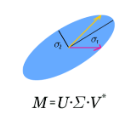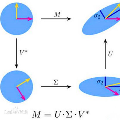In this paper, we consider the precoder design for downlink multiple-input multiple-output (MIMO) rate-splitting multiple access (RSMA) systems. The proposed scheme with simultaneous diagonalization (SD) decomposes the MIMO channel matrices of the users into scalar channels via higher-order generalized singular value decomposition for the common message (CM) and block diagonalization (BD) for the private messages, thereby enabling low-complexity element-by-element successive interference cancellation (SIC) and decoding at the receivers. Furthermore, the proposed SD MIMO-RSMA overcomes a critical limitation in RSMA systems, whereby the achievable rate of the CM is restricted by the users with weak effective MIMO channel for the CM, by excluding a subset of users from decoding the CM. We formulate a non-convex weighted sum rate (WSR) optimization problem for SD MIMO-RSMA and solve it via successive convex approximation to obtain a locally optimal solution. Our simulation results reveal that, for both perfect and imperfect CSI, the proposed SD MIMO-RSMA with user exclusion outperforms baseline MIMO-RSMA schemes and linear BD precoding.
翻译:在本文中,我们考虑对多重投入多重产出(MSIM)分率多重存取系统进行下链接(MSIM)的预编码设计;同时对分率(SD)的多重存取(RSMA)系统的拟议办法,即同时进行对分化(SD),通过对通用电文(CM)和私人电文的块形对分解(BD),将用户的MIMO渠道分解成螺旋带,从而将MIMO渠道的分解成高阶通用超值,通过对通用电文(CM)和私人电文的块形对分解分解(BD),从而使得低兼容性要素逐个逐个取消干扰(SIC)并解码;此外,拟议的SD MIM-RSMA系统可实现的速率,由于CSIS-MSD基线计划不完善和不完善,被MIMIMA用户排除的SD MIMAS-MA基线计划,我们的模拟结果显示,CIS-MMAS-MAS-MA前的SMA系统模拟计划是完美和不完善和不完善的。




